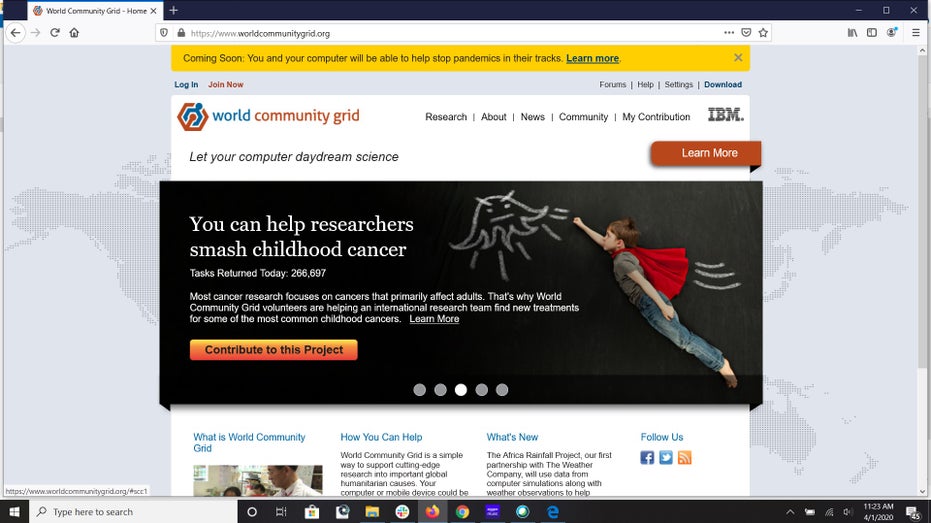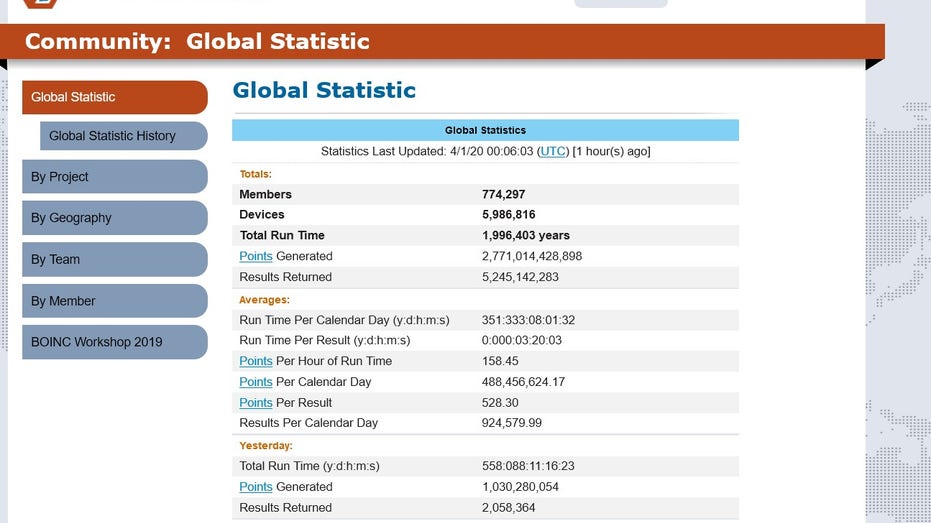How to help coronavirus scientists run experiments using your laptop
An app runs in the background to complete equations as part of virtual experiments
Get all the latest news on coronavirus and more delivered daily to your inbox. Sign up here.
Anyone with a computer can join IBM in its efforts to help scientists find a treatment for the novel coronavirus.
The Trump administration announced that it was partnering with IBM on March 23 to make more supercomputing power available to scientists looking for virus treatment possibilities through the "COVID-19 High Performance Computing Consortium."
Now, the computer hardware company and Scripps Research are turning to the public for help in finding a cure through a free app that uses an individual computer's brainpower while it's idle or in light use to help scientists solve mathematical equations that represent virtual experiments.
"[Scientists] now often first perform virtual experiments by computer to simulate the interaction of chemicals with viruses," IBM spokesperson Ari Fishkind told FOX Business. "The problem is, it takes a lot of computing power to do this quickly, and many researchers have to share expensive computers with their peers."
Because researchers must share, there is a limit to how many virtual experiments they can do, Fishkind said.
"They need a lot of affordable computer horsepower to get the job done," he added.
The IBM-Scripps project is powered through IBM's World Community Grid, which acts as a supercomputer by sourcing power from a number of small computers, FIshkind said. It converts a traditional scientific experiment into a math problem that a typical PC, laptop or Macbook can solve.
Each volunteer's computer does millions of calculations that represent chemical compound experiments. Once those calculations are complete, they may "point to a successful science experiment," Fishkind said.
NEW CORONAVIRUS TEST DELIVERS RESULTS WITHIN 15 MINUTES
"This is a really easy way for people who can't leave their homes or be on the frontlines to help," Fishkind said.
The purpose of reaching out to the public to put their computers to work while they are idle is to save money, resources and time in helping scientists identify chemical compounds that can be used for potential COVID-19 treatments, according to IBM.

World Community Grid Home Page / IBM
Hundreds of millions of experiments that would have taken years to complete without supercomputing power can be done in days or hours with the help of the public.
"There are thousands of novel chemical compounds and existing in current medicines" that can be combined and tested to create a treatment," Fishkind said. "The IBM-Scripps project will allow scientists to "test everything" and "accelerate the process."
CORONAVIRUS PANDEMIC LEADS TO SPIKE IN VOLUNTEER SCIENTISTS
Once calculations solved by an individual's computer are sent to scientists, those scientists physically "look at the results and put [the compound combination] in a traditional laboratory," Fishkind explained.
Volunteers download the app, give their email addresses, get an email confirmation and are then able to take part in the effort in several weeks when the project becomes available.
Fishkind added that the app will sense when people aren't actively using devices, and when the app does initiate calculations, nothing on a user's computer will change. The app is safe and cannot access any personal files on a user's computer.

World Community Grid Home Page / IBM
GET FOX BUSINESS ON THE GO BY CLICKING HERE
From a broader perspective, this project and others like it will help computer engineers, developers and scientists come together to create a "standard" process for turning science experiments into mathematical equations that can then be physically tested once key resources needed in those experiments can be narrowed down.
"They're able to be more efficient and streamlined in their experimental process and zero in on compounds that show the most promise instead of looking for a needle in a haystack," Fishkind said.
Data from the project will be made public once available. Volunteers who don't need any previous tech or science background to participate can click here to sign up.





















